“Which English translation of The Hunchback of Notre-Dame should I read?”
I found so much information on translations of The Hunchback of Notre-Dame that I had to split this post into two! Part 1 of this post talks about the book’s title and “lost” chapters and gives information about 8 translations published before 1900.
This page is Part 2. It focuses on 7 translations published after 1900 and gives information about a few related books.
If you just want a quick-and-dirty recommendation on which translation to choose, jump to the conclusion at the bottom of this page.
The Hunchback of Notre-Dame: Translations in English
Described in Part 1 (separate page)
- 1833 – William Hazlitt
- 1833 – Frederic Shoberl
- 1839 – Anonymous (Foster and Hextall)
- 1862 – Henry L. Williams
- 1882 – A. Langdon Alger
- 1888 – Isabel F. Hapgood
- 1888 – Anonymous (Little, Brown, & Co.)
- 1892 – J. Carroll Beckwith
Described Below (on this page)
There are 4 complete modern translations in print, plus one abridged translation.
- 1902 – Jessie Haynes
- 1941 – Anonymous (Modern Library)
- 1956 – Lowell Bair (ABRIDGED, Bantam)
- 1964 – Walter J. Cobb (Signet)
- 1978 – John Sturrock (Penguin)
- 1993 – Alban J. Krailsheimer (Oxford)
- 2002 – Anonymous (Modern Library) edited by Catherine Liu
The Hunchback of Notre-Dame: Translation Comparison
Extracts have been included below so that you can see how the different translations sound.
The Hunchback of Notre-Dame: Other Info and Resources
For links to online guides and a few related books, jump down the page.
About the Haynes translation of The Hunchback of Notre-Dame
From looking at a copy published in 1902 by P.F. Collier & Son in New York, it seems that perhaps this translation was originally done for a 20-volume series called “The Trench Classical Romances”, edited by Edmund Gosse. The Haynes translation is the one reprinted in “The Harvard Classics Shelf of Fiction”, selected by Charles W. Eliot, edited with notes and introductions by William Allan Neilson, also published by P.F. Collier & Son.
Extract from the Haynes translation of The Hunchback of Notre-Dame
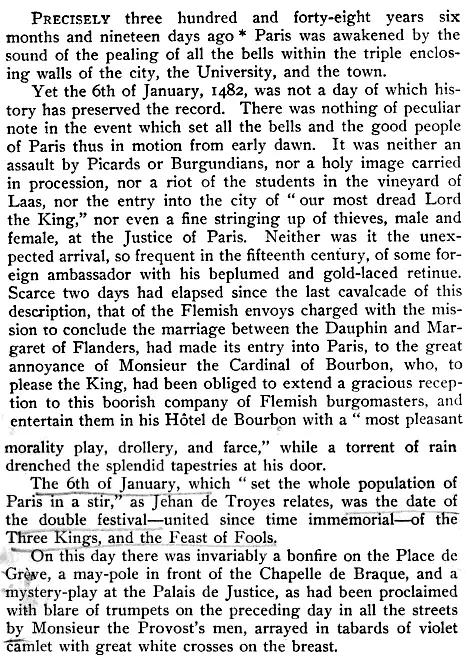
Get the Haynes translation of The Hunchback of Notre-Dame
I see reprints available from 1930, 1955, and 1983, but no current editions.
This translation is in the public domain. Scans are freely available on Archive.org.
Get the Anonymous (Modern Library) translation of The Hunchback of Notre-Dame
I’m assuming this translation was new in 1941, but I don’t actually know that for sure. Actually… I think this is just a reprint of the Shoberl translation! I looked at a 1992 Modern Library edition, and the text seemed to match.
In any case, there’s now an updated version edited by Catherine Liu. In her preface to the updated version, Liu says, “I have made the novel more accessible to a contemporary audience…. The original translation was hasty and prudish to the extreme.”
If for some reason you want the 1941 edition, you may be able to find a second-hand copy using the link below.
Who is Lowell Bair?
He translated Madame Bovary, The Phantom of the Opera, The Count of Monte Cristo, Cyrano de Bergerac, Candide, The Three Musketeers, and The Red and the Black, among other works in French.
About the Bair translation of The Hunchback of Notre-Dame
This translation is ABRIDGED.
In Encyclopedia of Literary Translation into English edited by Olive Classe, (Volume 1, page 674), John R. Whittaker says, “Bair’s The Hunchback of Notre Dame (1956) tends towards [modern, well-rounded phrases]. The simple and direct language, though generally appropriate, is sometimes strained. This translation displays little or no attempt to convey a period flavour, and it is apt to omit problematic phrases.”
Extract from the Bair translation of The Hunchback of Notre-Dame
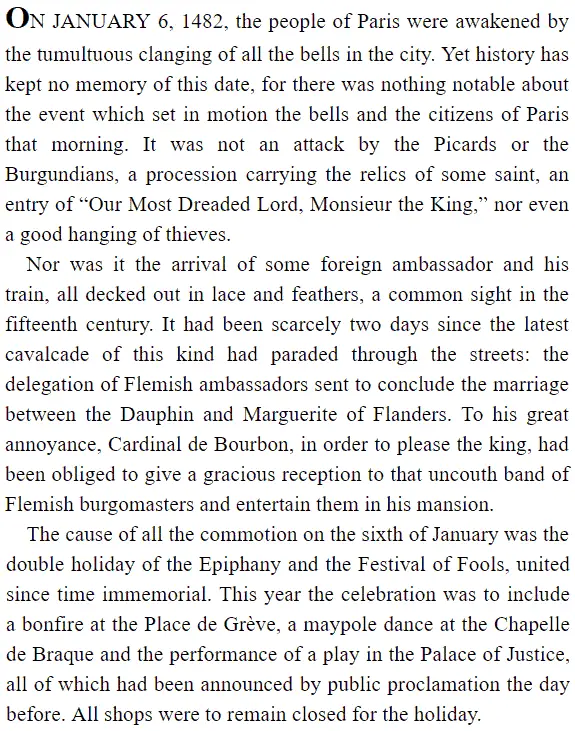
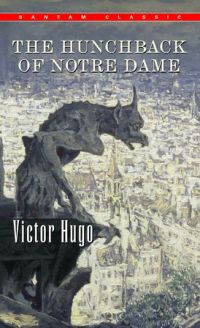
Get the Bantam Bair translation of The Hunchback of Notre Dame
ABRIDGED.
Available as a mass-market paperback (ISBN 9780553213706, 384 pages).
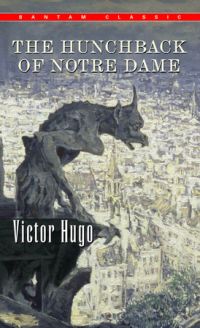
Get the Bantam Bair translation of The Hunchback of Notre Dame
ABRIDGED.
Available as an ebook (ISBN 9780553903980).
About the Cobb translation of The Hunchback of Notre-Dame
The Oxford Guide to Literature in English Translation edited by Peter France on page 278 says that the Cobb translation is “stilted and inaccurate [compared to Sturrock].”
Extract from the Cobb translation of The Hunchback of Notre-Dame
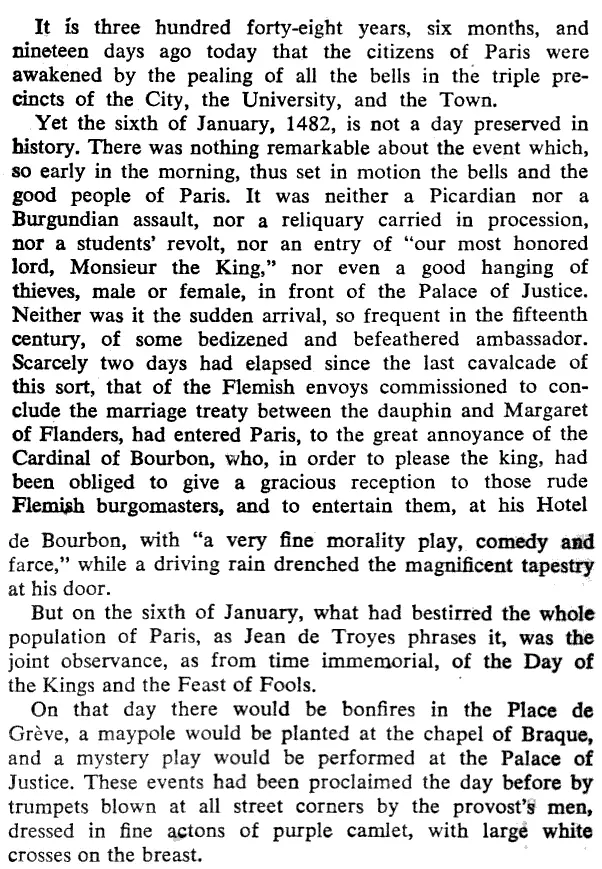
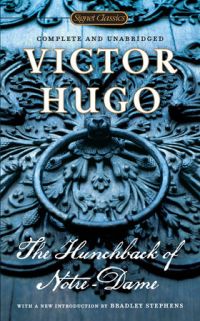
Get the Signet Cobb translation of The Hunchback of Notre Dame
Includes an introduction by Bradley Stephens and an afterword by Graham Robb.
Available as a mass-market paperback (ISBN 9780451531513, 528 pages).
Who is John Sturrock?
John Sturrock is a writer, critic, and translator. He contributed to the Penguin translation of Marcel Proust’s In Search of Lost Time.
About the Sturrock translation of The Hunchback of Notre-Dame
The Oxford Guide to Literature in English Translation edited by Peter France on page 278 says that the Sturrock translation is “freer” than Krailsheimer’s: “tending to eschew archaism, it reads very naturally, especially the dialogue.”
Sturrock says in his introduction: “[The previous translations] which I have seen have all seemed to me to betray Hugo to some degree by making him read like a historical novelist of a much stiffer, more archaic kind than he actually was. The striking thing about the French of Notre-Dame, as about Hugo’s style generally, is its formidable directness and resourcefulness, directness in syntax and resourcefulness in vocabulary…. There is no strong sense, reading Notre-Dame today, of a story written in the French of 1830, and no disloyalty at all, consequently, in translating it into plain, colloquial English.”
Sturrock also says in the introduction to his translation: “There is one specific difficulty in translating this novel, which is Hugo’s tireless introduction of archaisms, including, to make things worse, the archaic jargon of the 15th century underworld…. [H]e loves the lexicology of secret languages.”
Extract from the Sturrock translation of The Hunchback of Notre-Dame
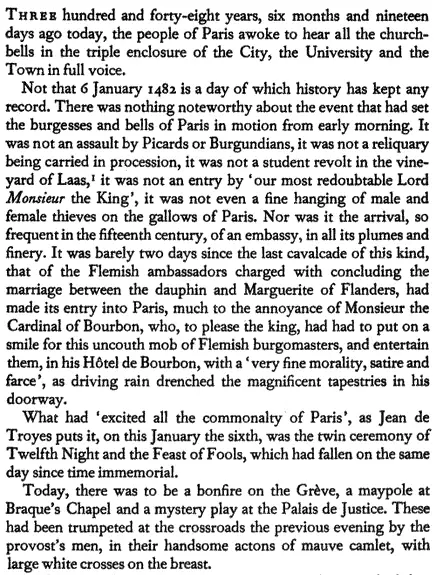

Get the Penguin Classics Sturrock translation of Notre-Dame of Paris
Includes an introduction by the translator.
Available as a paperback (ISBN 9780140443530, 496 pages).
Who was Alban John Krailsheimer?
According to Oxford World’s Classics:
A. J. Krailsheimer was Emeritus Student and Tutor in French at Christ Church, Oxford from 1957 until his retirement in 1988. His published work is mostly on the sixteenth and seventeenth centuries, but among his translations are Balzac’s Pere Goriot, Flaubert’s Three Tales (both also in Oxford World’s Classics), Samammbo, and Bouvard et Pechuchet.
He died 7 May 2001 at the age of 80.
About the Krailsheimer translation of The Hunchback of Notre-Dame
The Oxford Guide to Literature in English Translation edited by Peter France on page 278 says that the Krailsheimer translation sticks “closely to Hugo’s syntax, avoiding unnecessary interpretation and keeping explanation for the end notes.”
In Encyclopedia of Literary Translation into English edited by Olive Classe, (Volume 1, page 674), John R. Whittaker says, “Krailsheimer’s Notre-Dame de Paris (1993) is closer [than Bair’s] to the sense of the original.”
Extract from the Krailsheimer translation of The Hunchback of Notre-Dame
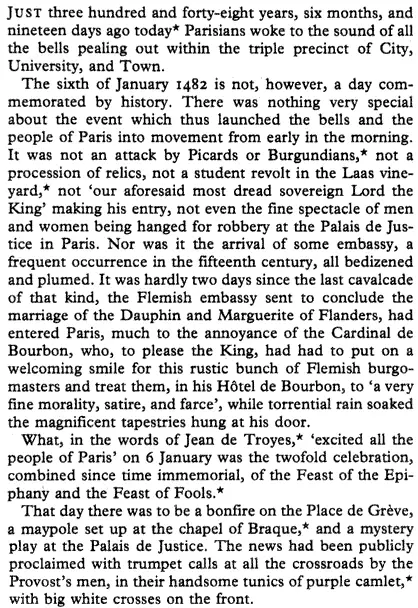
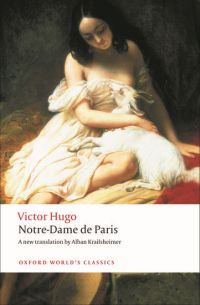
Get the Oxford Krailsheimer translation of Notre-Dame de Paris
Includes an introduction, note on the text, select bibliography, chronology, note on money, and explanatory notes by the translator.
Available as a paperback (ISBN 9780199555802, 592 pages).
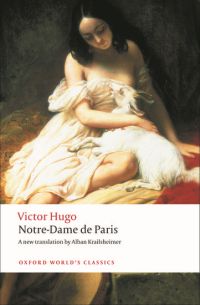
Get the Oxford Krailsheimer translation of Notre-Dame de Paris
Includes an introduction, note on the text, select bibliography, chronology, note on money, and explanatory notes by the translator.
Available as an ebook.
Who is Catherine Liu?
Catherine Liu is a Chinese-American writer and academic.
» Read a three-page biography of Catherine Liu from the University of Minnesota.
About the Anonymous / Catherine Liu translation of The Hunchback of Notre-Dame
According to her translator’s preface, Liu has restored the eroticism of the French original that was largely absent from the “anonymous” 1941 Modern Library English translation (which I suspect is the Shoberl translation) that she was working from:
Not only were descriptions of La Esmeralda’s heaving bosom and graceful legs simply dropped, Claude Frollo’s erotic obsession and sadism were veiled in Anglo-Saxon euphemisms that Hugo would have ridiculed. The novel is much more sensual, much earthier, and much more troubling when this erotic language is restored to Hugo’s portrait of unreciprocated love.
Elizabeth McCraken’s introduction addresses misconceptions arising from the novel’s ubiquity in popular culture. She worries that people won’t want to read the book because they already know the story and the characters, but knows that those who nevertheless plunge in will be well rewarded, as there are many subtleties as well as obvious merits to appreciate.
Extract from the Anonymous / Catherine Liu translation of The Hunchback of Notre-Dame
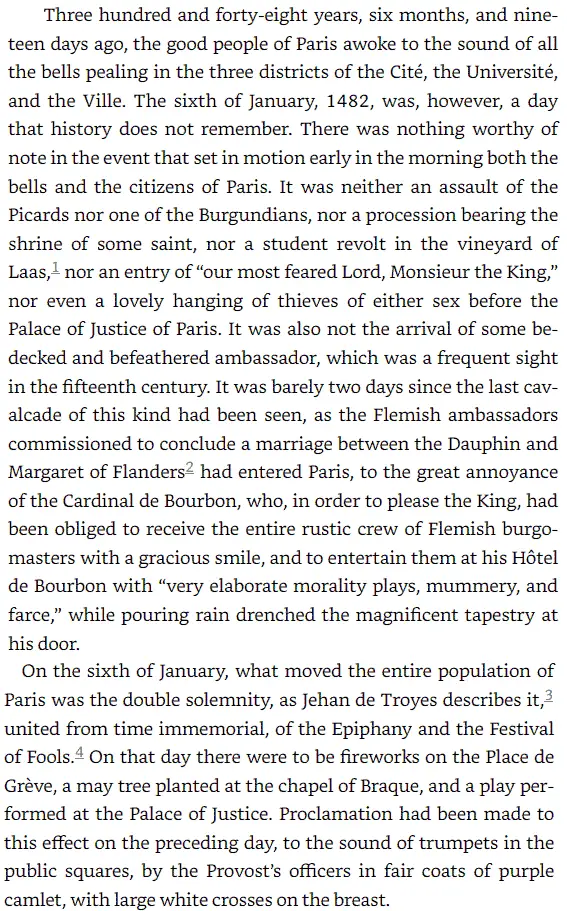
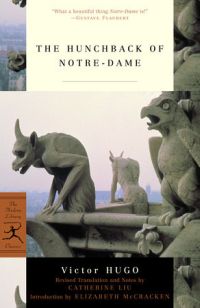
Get the Modern Library Anonymous (1941)/Liu translation of The Hunchback of Notre-Dame
Revised translation and notes by Catherine Liu. Includes an author bio, the author's preface, a translator's preface, and an introduction by Elizabeth McCracken.
Available as a paperback (ISBN 9780679642572, 512 pages).
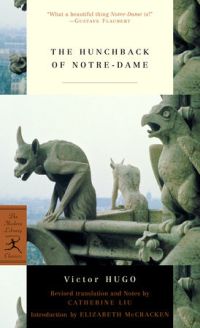
Get the Modern Library Anonymous (1941)/Liu translation of The Hunchback of Notre-Dame
Revised translation and notes by Catherine Liu. Includes an author bio, the author's preface, a translator's preface, and an introduction by Elizabeth McCracken.
Available as an ebook (ISBN 9780307417152).
Other Works by Victor Hugo
In France, Hugo is known as a poet. He also wrote plays. However, in the English-speaking world, he’s known as a novelist, primarily for Notre-Dame and Les Miserables. Hugo’s other fictional works include the novels Toilers of the Sea, The Man Who Laughs, and Ninety-Three, and the novella The Last Day of a Condemned Man.
» What’s the best translation of Les Miserables?
Study Guides for The Hunchback of Notre-Dame
Shmoop guide to The Hunchback of Notre-Dame
Cliffs Notes for The Hunchback of Notre-Dame
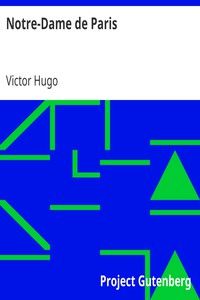
Get Notre-Dame de Paris by Victor Hugo
Hugo's original French text.
Available as an ebook.

Get Victor Hugo: A Biography by Graham Robb
“Both necessary and highly readable, and easily outclasses all existing Hugo biographies in English.” ― New York Times Book Review front-page review
Available as paperback (ISBN 9780393318999, 720 pages).
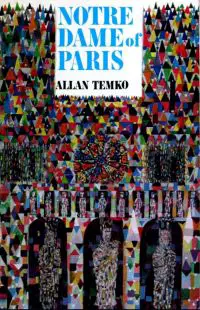
Get Notre Dame of Paris: The Biography of a Cathedral by Allan Temko
It's out of print, but you may be able to find a second-hand copy using the links below.
Available as a hardcover or paperback.

Get Notre-Dame de Paris: History, Art, and Revival from 1163 to Tomorrow by Antonia Felix
"This stunning photographic ode to one of the world's most beloved treasures pays tribute to Notre-Dame--its place in history and in culture, and its rebirth--in the wake of the tragic fire that nearly destroyed it."
Available as a hardcover (ISBN 9781454938316).
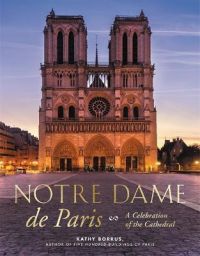
Get Notre Dame de Paris : A Celebration of the Cathedral by Kathy Borrus
Details the impressive architecture of the building, the priceless artefacts it contains, and the major historical events that have taken place in its presence. Shows, through film stills and artwork reproductions, the ways in which the Notre Dame has permeated our popular culture. Coupled with informative text for each image, Notre Dame is the definitive book on the history of this landmark building.
Available as a hardcover (ISBN 9780762497119, 128 pages).
What’s the best Hunchback of Notre-Dame translation?
As usual, I think it depends on your budget, your taste, and your purpose.
If you want a free ebook, the most user-friendly one is the Hapgood translation from Standard Ebooks.
If you want a cheap paperback, the Alger translation (available from Dover and Barnes & Noble) is the one I’d choose from among reprints of public-domain translations; I think the extract reads the most naturally.
If you want a smooth, modern English translation, the Penguin Sturrock translation seems like a good choice.
If you want a translation with a more French kind of flavor, or one aimed at a more academic/scholarly kind of audience, the Oxford Krailsheimer translation would be my recommendation.
Which one appeals the most to you? Let us know in the comments!

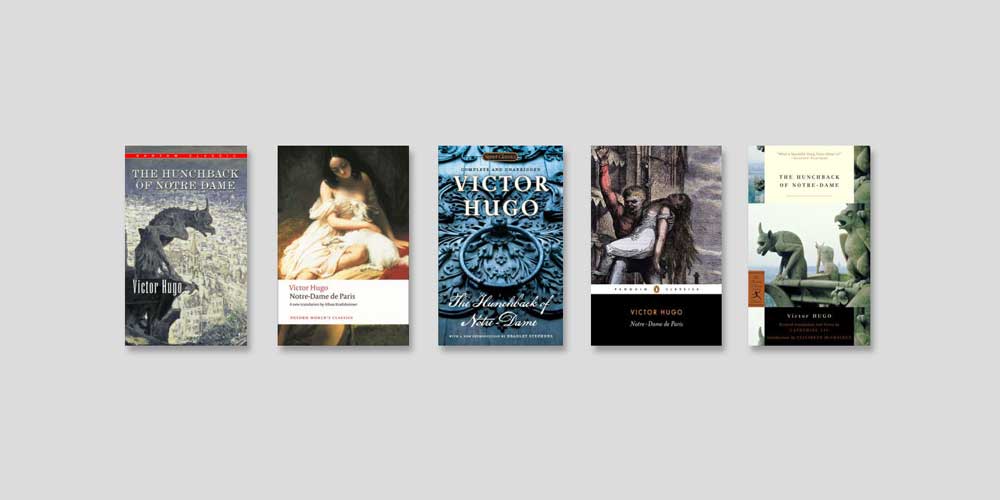
My library has a xlation by Catherine Liu but I’ve not found it talked about anywhere. Do you have any info? Thanks.
I believe you are talking about the Modern Library edition from 2002 listed above. There are a few mentions of this version on Reddit, but I couldn’t find any articles or reviews devoted to assessing this version, maybe because it’s not a new translation, just a revision of an existing one.
You’re so right regarding translations. I started reading the classics via Classic Illustrated Comics and as an adult continued to read them…Hugo was a favourite. I have read 4 of the translations you have included in your research and settled on my favourite. Your work here will be very helpful to others interested in this great novel. Translations do make a difference so many thanks.
The Oxford World’s Classics is now my recommended version,followed by the Penguin version. Interestingly enough, I have also enjoyed the older Hapgood translation and would still recommend it…I have read it 3 times now!
Thanks for sharing your experience! It certainly sounds like you’ve spent a lot of time with Hugo’s works. 🙂
Thanks for all this info! There were so many versions out there, but I would prefer to stick to as close to the original verison of Hugo’s work as possible. Decided to go with the Oxford Krailsheimer translation!
Good Lord!! Way TMI!! Is it so difficult to just say this one’s pretty good and seems true to the original text…? 🤷🏼♀️
You’re right! Many people are perfectly happy with the typical responses you can see on forums and message boards, which usually more or less say “I read this one, it was fine.” But some people like to gather more information before making a decision, or are just generally interested in knowing random details about famous books. Information about translations tends to be scattered, so… I collected it. I hope it was at least somewhat entertaining!
They are super helpful! Much better than simple comments about each translation. Thank you for collecting these information!
Thank you for the positive feedback!
Thank you very much! You did a wonderful and thorough comparison and saved me both time and money. I cannot thank you enough for doing this!
That’s what I like to hear! Thanks for taking the time to comment. 🙂
I just recently discovered this website. Thank you to everyone involved. I want to get more into the classics but I know I cannot be the only person who feels overwhelmed with all the translation options. It’s easy to get discouraged and want to give up. This is a valuable resource!
Hi again, Mo! I think a lot of people when they first get into the classics don’t think much about the choice of translation. People just buy whatever’s newest or cheapest or locally available, or whatever is assigned for a class, and I think usually that works out just fine. But sometimes the translation has a big impact on how a reader experiences a novel, so I think it’s worth considering different versions in advance. An option for anyone new to classics who feels overwhelmed by all the different translation choices is to first focus on English and American classics that don’t need to be translated (many of which are public domain and can be obtained online for free), or more recent foreign “modern classics” that have probably only been translated once (like One Hundred Years of Solitude, for example).
Thank you so much. I wish I had discovered this site earlier! I do want to read Hunchback this year. I appreciate all the information as I make my decision.
I found this fascinating! I read all of your Part 1. It’s interesting to notice the variation in translation — that people “hear” the same language differently, and express it differently. Translation can make or break a story. One of my favourite books of all time is Dumas’ The Three Musketeers. Having read it in my teens, I picked up a copy in adulthood and was utterly dismayed by how unengaging it was, not at all as I’d remembered it. Translation was the difference between a story that would leave an indelible, lifelong mark — or be relegated to the DNF pile. It’s valuable to have this insight for making an informed choice. Thanks.
Wow, what a clear-cut example of a reader experiencing two translations as two entirely different books! Thanks for sharing your story about The Three Musketeers, Monica. 🙂 Do you know which two versions they were?
As a very avid reader of translated classics, I for one sure appreciate that you do it—I’ve learned to just come here first!
Thanks for the positive feedback! It’s good to hear. 🙂